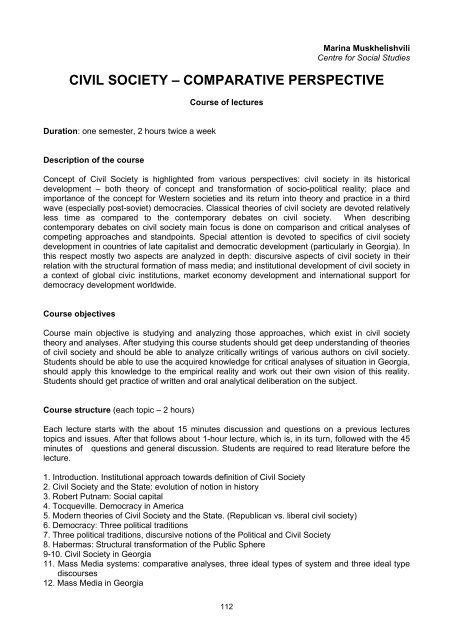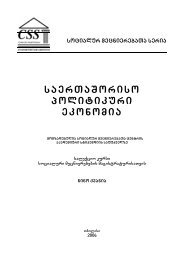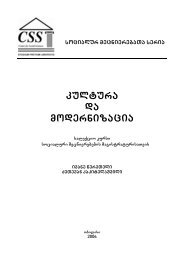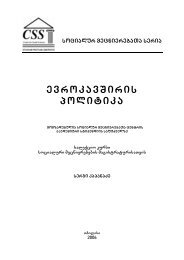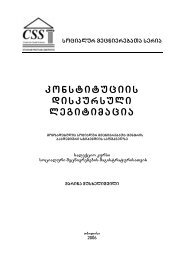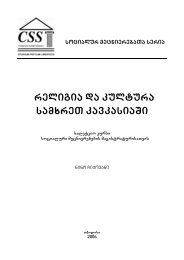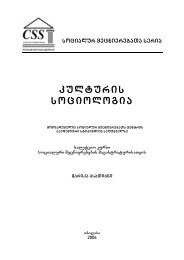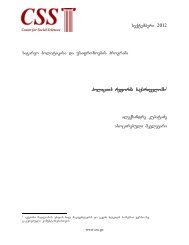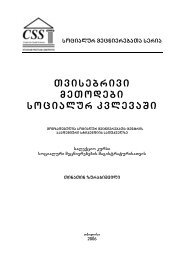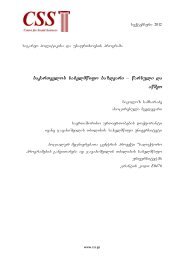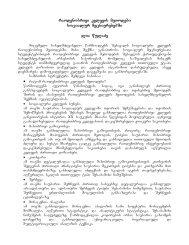samoqalaqo sazogadoeba - Center for Social Sciences
samoqalaqo sazogadoeba - Center for Social Sciences
samoqalaqo sazogadoeba - Center for Social Sciences
You also want an ePaper? Increase the reach of your titles
YUMPU automatically turns print PDFs into web optimized ePapers that Google loves.
Marina Muskhelishvili<br />
Centre <strong>for</strong> <strong>Social</strong> Studies<br />
CIVIL SOCIETY – COMPARATIVE PERSPECTIVE<br />
Course of lectures<br />
Duration: one semester, 2 hours twice a week<br />
Description of the course<br />
Concept of Civil Society is highlighted from various perspectives: civil society in its historical<br />
development – both theory of concept and trans<strong>for</strong>mation of socio-political reality; place and<br />
importance of the concept <strong>for</strong> Western societies and its return into theory and practice in a third<br />
wave (especially post-soviet) democracies. Classical theories of civil society are devoted relatively<br />
less time as compared to the contemporary debates on civil society. When describing<br />
contemporary debates on civil society main focus is done on comparison and critical analyses of<br />
competing approaches and standpoints. Special attention is devoted to specifics of civil society<br />
development in countries of late capitalist and democratic development (particularly in Georgia). In<br />
this respect mostly two aspects are analyzed in depth: discursive aspects of civil society in their<br />
relation with the structural <strong>for</strong>mation of mass media; and institutional development of civil society in<br />
a context of global civic institutions, market economy development and international support <strong>for</strong><br />
democracy development worldwide.<br />
Course objectives<br />
Course main objective is studying and analyzing those approaches, which exist in civil society<br />
theory and analyses. After studying this course students should get deep understanding of theories<br />
of civil society and should be able to analyze critically writings of various authors on civil society.<br />
Students should be able to use the acquired knowledge <strong>for</strong> critical analyses of situation in Georgia,<br />
should apply this knowledge to the empirical reality and work out their own vision of this reality.<br />
Students should get practice of written and oral analytical deliberation on the subject.<br />
Course structure (each topic – 2 hours)<br />
Each lecture starts with the about 15 minutes discussion and questions on a previous lectures<br />
topics and issues. After that follows about 1-hour lecture, which is, in its turn, followed with the 45<br />
minutes of questions and general discussion. Students are required to read literature be<strong>for</strong>e the<br />
lecture.<br />
1. Introduction. Institutional approach towards definition of Civil Society<br />
2. Civil Society and the State: evolution of notion in history<br />
3. Robert Putnam: <strong>Social</strong> capital<br />
4. Tocqueville. Democracy in America<br />
5. Modern theories of Civil Society and the State. (Republican vs. liberal civil society)<br />
6. Democracy: Three political traditions<br />
7. Three political traditions, discursive notions of the Political and Civil Society<br />
8. Habermas: Structural trans<strong>for</strong>mation of the Public Sphere<br />
9-10. Civil Society in Georgia<br />
11. Mass Media systems: comparative analyses, three ideal types of system and three ideal type<br />
discourses<br />
12. Mass Media in Georgia<br />
112


